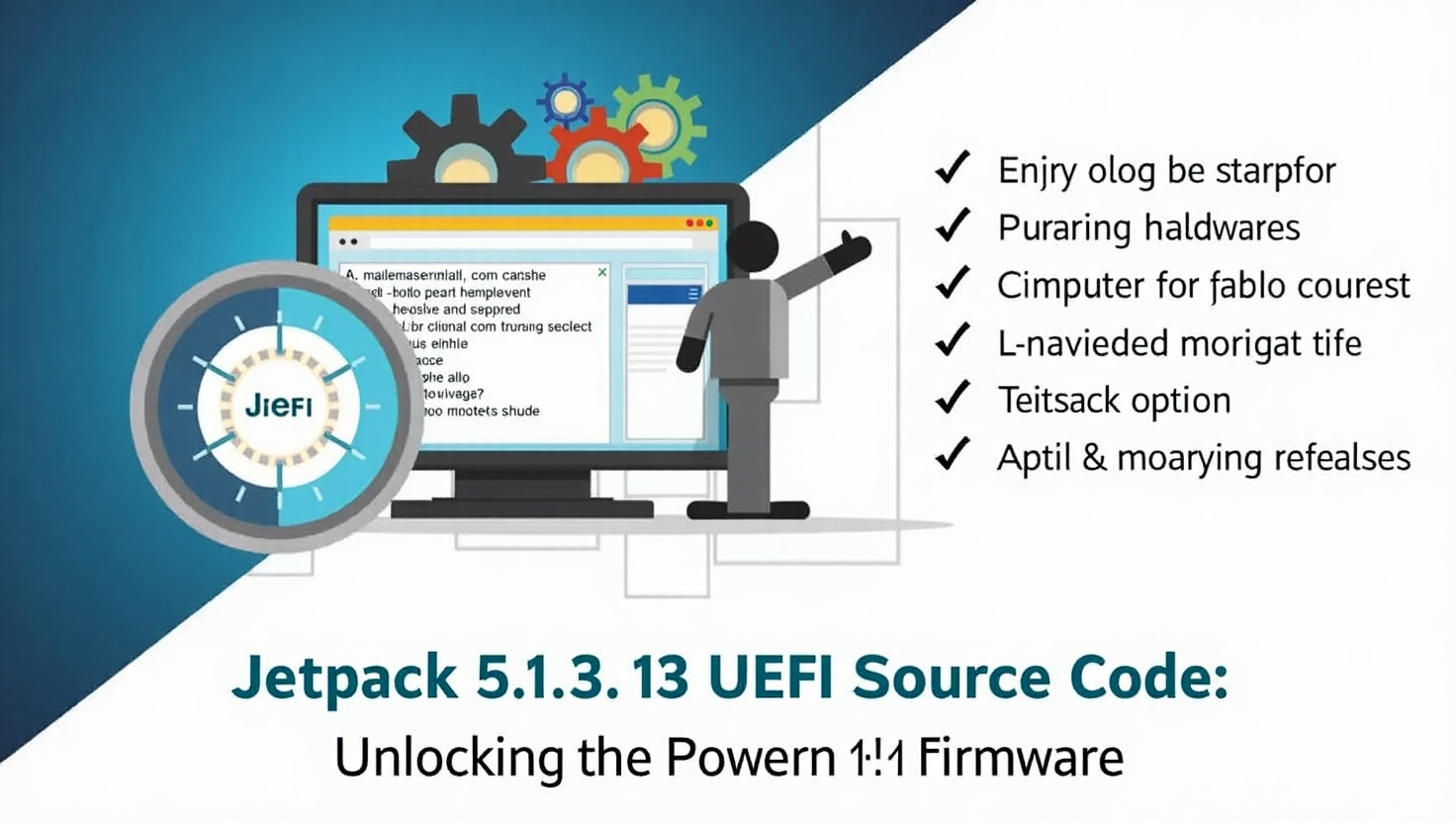
Understanding the jetpack 5.1.3 uefi source code is essential for anyone interested in the inner workings of modern computer systems. This powerful firmware plays a crucial role in how computers start and manage hardware. Simply put, the UEFI (Unified Extensible Firmware Interface) source code acts as the brain that wakes your computer up and prepares it for use. With Jetpack 5.1.3, developers and tech enthusiasts get access to a reliable, efficient, and flexible firmware platform that supports advanced hardware and security features. This article explores everything about the jetpack 5.1.3 uefi source code, breaking down complex topics into easy-to-understand language for beginners and experts alike.
What is Jetpack 5.1.3 UEFI Source Code?
The jetpack 5.1.3 uefi source code is the program that controls the startup process of modern computers and devices. Unlike the older BIOS system, UEFI is designed to be faster, more secure, and flexible. Jetpack 5.1.3 is a specific version of the UEFI firmware package, which contains the source code developers use to customize and improve their computer’s startup process. This source code is written in programming languages like C and assembly and can be modified by hardware manufacturers or software developers to suit particular needs.
Jetpack 5.1.3 supports advanced hardware features such as secure boot, faster boot times, and better compatibility with modern processors. Understanding the jetpack 5.1.3 uefi source code allows developers to improve device performance, security, and user experience.
Why is UEFI Important in Modern Computing?
UEFI has replaced the old BIOS system because it overcomes many of the limitations that BIOS had. The jetpack 5.1.3 uefi source code ensures that devices can boot faster and support new hardware technologies seamlessly. It also adds a security layer to prevent unauthorized software from loading during startup, known as Secure Boot.
Devices running on Jetpack 5.1.3 can handle larger hard drives, support networking features during boot, and have a graphical interface instead of the old text-based BIOS. For anyone working on embedded systems, PCs, or servers, knowing how the jetpack 5.1.3 uefi source code functions is key to creating reliable and secure systems.
How Does Jetpack 5.1.3 UEFI Source Code Work?
At its core, the jetpack 5.1.3 uefi source code performs the initial hardware checks and then hands over control to the operating system. Here’s a simplified overview of its working:
- Power On Self Test (POST): When you turn on your device, Jetpack 5.1.3 runs tests to make sure all the hardware components like CPU, memory, and storage are working properly.
- Initialization: The source code initializes hardware components, setting them up so the OS can use them without issues.
- Boot Manager: Jetpack 5.1.3 includes a boot manager that decides which device to boot from, such as a hard drive or USB stick.
- Loading the OS: Finally, it loads the operating system kernel into memory and transfers control, allowing your device to start up fully.
Understanding this flow in the jetpack 5.1.3 uefi source code is crucial for developers who want to optimize or customize the boot process.
Key Features of Jetpack 5.1.3 UEFI Source Code
| Read More About : Doodflix: Your Gateway to a World of Effortless Streaming |
The jetpack 5.1.3 uefi source code is packed with features that make it stand out from older firmware systems:
- Secure Boot: Prevents unauthorized software and malware from starting during boot.
- Fast Boot: Reduces startup times by skipping unnecessary checks.
- Modular Design: Allows developers to add or remove components easily.
- Support for Large Drives: Handles hard drives larger than 2 TB.
- Network Booting: Supports booting from network devices, useful in enterprise environments.
- Graphical Interface: Offers a user-friendly graphical setup screen instead of just text.
These features make Jetpack 5.1.3 a modern, secure, and flexible firmware solution.
Understanding the Source Code Structure
The jetpack 5.1.3 uefi source code is organized into modules and libraries. Each module handles specific functions like memory management, device control, or security. Developers can study or modify these modules to suit their hardware or software requirements.
Key components in the source code include:
- PEI (Pre-EFI Initialization): Initializes basic hardware.
- DXE (Driver Execution Environment): Loads drivers for hardware components.
- BDS (Boot Device Selection): Manages which device to boot.
- Runtime Services: Provides services even after OS has started.
By understanding this structure, developers can customize the jetpack 5.1.3 uefi source code to improve system performance and security.
How to Access and Use Jetpack 5.1.3 UEFI Source Code
Accessing the jetpack 5.1.3 uefi source code usually requires downloading it from official repositories or hardware vendors who provide the source for customization. The source code is typically available under open-source licenses that allow modification and redistribution.
Developers use integrated development environments (IDEs) and specialized tools to build and test changes to the source code. Knowledge of programming languages such as C and understanding of firmware concepts is essential to work effectively with the Jetpack 5.1.3 code.
Practical Applications of Jetpack 5.1.3 UEFI Source Code
The jetpack 5.1.3 uefi source code is widely used in various fields:
- Embedded Systems: Customized firmware for devices like smart TVs, automotive systems, and IoT gadgets.
- PC Manufacturing: Hardware companies tailor Jetpack 5.1.3 for faster boot and better security.
- Server Environments: Ensures reliable and secure server startup.
- Security Solutions: Secure boot features help protect devices from rootkits and malware.
Understanding this source code can help professionals design better, safer devices that start quickly and reliably.
Challenges in Working with Jetpack 5.1.3 UEFI Source Code
While powerful, working with the jetpack 5.1.3 uefi source code presents some challenges:
- Complexity: The source code is large and complex, requiring deep technical knowledge.
- Hardware Compatibility: Changes must be tested on real hardware to ensure stability.
- Security Risks: Improper modifications can weaken device security.
- Debugging: Firmware bugs are harder to detect and fix than software bugs.
Despite these challenges, mastering Jetpack 5.1.3 offers great rewards in system control and security.
Future of Jetpack and UEFI Development
The jetpack 5.1.3 uefi source code represents a step forward in firmware technology, but development continues to evolve. Future versions aim to improve security, support emerging hardware, and provide more customization options for developers.
As devices become smarter and more connected, secure and efficient firmware like Jetpack will be vital. Keeping up with updates to the jetpack 5.1.3 uefi source code and its successors ensures your systems remain cutting-edge.
(FAQs)
1. What is the difference between BIOS and Jetpack 5.1.3 UEFI source code?
BIOS is an older firmware interface that has limitations in speed, security, and hardware support. Jetpack 5.1.3 UEFI source code offers faster booting, enhanced security features like Secure Boot, support for larger drives, and a graphical interface.
2. Can I modify the jetpack 5.1.3 uefi source code for my own device?
Yes, the source code is often available under open licenses allowing customization. However, you need programming skills and knowledge of hardware to modify and test it properly.
3. How does Secure Boot work in Jetpack 5.1.3?
Secure Boot checks that all software loaded during startup is signed and trusted. This prevents malware from loading before the operating system, enhancing system security.
4. Where can I download the jetpack 5.1.3 uefi source code?
The source code can usually be found on official vendor sites or trusted open-source repositories related to UEFI development.
5. Is Jetpack 5.1.3 UEFI source code compatible with all hardware?
While it supports many modern devices, some hardware may require specific drivers or modules. Compatibility depends on how the source code is configured and built.
Conclusion
The jetpack 5.1.3 uefi source code is a powerful tool that enables modern devices to start quickly, securely, and efficiently. Whether you’re a developer, engineer, or tech enthusiast, understanding this source code opens doors to customizing and enhancing your computing environment. With its modular design and strong security features, Jetpack 5.1.3 remains a leading choice for firmware development in today’s fast-paced tech world.


